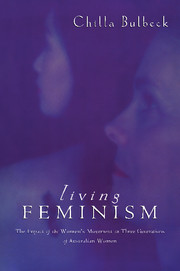Book contents
- Frontmatter
- Contents
- List of Tables
- Preface
- List of Women Who Told their Biographies for the Book
- Abbreviations
- Introduction
- Part One Women's Lives Through A Feminist Lens
- Part Two Present and Future Feminisms
- 5 Finding Feminism
- 6 Is Feminism a White Middle-class Movement?
- 7 Beating the Backlash
- Conclusion
- Appendix 1
- Appendix 2
- Notes
- Bibliography
- Index
7 - Beating the Backlash
Published online by Cambridge University Press: 20 May 2010
- Frontmatter
- Contents
- List of Tables
- Preface
- List of Women Who Told their Biographies for the Book
- Abbreviations
- Introduction
- Part One Women's Lives Through A Feminist Lens
- Part Two Present and Future Feminisms
- 5 Finding Feminism
- 6 Is Feminism a White Middle-class Movement?
- 7 Beating the Backlash
- Conclusion
- Appendix 1
- Appendix 2
- Notes
- Bibliography
- Index
Summary
I was of an era of women who were perhaps dominated by males, or had a pretty raw deal in life. And these days there is so much that women can do, I find it difficult to understand why women allow themselves to get into situations where they are dominated.
(Martha)In the early 1980s Robyn Rowland (1984:18-19, 132–8) identified a backlash by conservative women against Australian feminism, women who opposed abortion legislation or protested at the devaluation of the homemaker role by feminism. Today, the term ‘backlash’ is more popularly understood as a backlash by men (Faludi 1991), although Beatrice Faust's (1994:48) short polemic Backlash? Balderdash! contests the claim that Australian feminism is suffering a backlash, largely because of the country's institutionalised welfare system and compulsory voting. The women of ‘middle Australia’ noted the existence of a welfare state which encompasses alternatives to violent marriages in income support schemes and work opportunities for women, and of a public discourse which asserts women's educational and occupational choices. They commended greater economic choices (as managers, policewomen and in the defence forces, for example) and equal pay, a welfare system allowing a woman to raise a child apart from the father (Riley-Smith 1992:16–24). While these women did not believe women were equal, they were ‘more equal than we were’. They referred to their mothers (both ‘mothers’ and ‘grandmothers’ according to my nomenclature) as ‘doormats’, ‘slaves’ and ‘subservient’, women who ‘had to sit back and listen’, ‘stayed home and raised the kids’, and ‘did everything for my father’ (Riley-Smith 1992:16–20).
- Type
- Chapter
- Information
- Living FeminismThe Impact of the Women's Movement on Three Generations of Australian Women, pp. 182 - 209Publisher: Cambridge University PressPrint publication year: 1997



